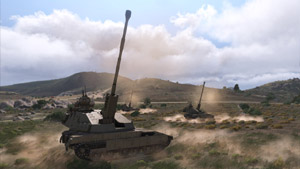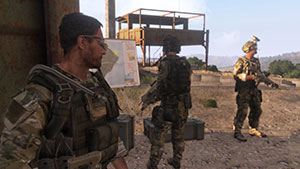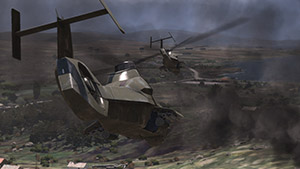It’s been a while, but we’re back with a brand new developer interview. Next up in our Report In™ series is Audio Lead Jan Dusek. Looking at the development process from the perspective of audio design, we asked Jan to tell us more about Arma 3’s sound engine, his work on the radio protocols, and the Arma 3 soundtrack!
We're often asked to let some of our people talk about what it's like to develop a game at BI. 'Report In!' gives you a more personal perspective on our team, a more detailed look at the way we go about our work, and fresh information about our ongoing projects.
As Audio Lead, Jan has been the driving force behind some of Arma 3’s most significant developments. An excellent example would be the revamped radio protocols, which were completely re-designed to sound more natural and seamless. Other core improvements relate to upgrades to Arma 3’s sound engine and the use of new audio samples. Last but not least, Jan also composed many of the tracks on the Arma 3 soundtrack - adding greatly to the sense of immersion and the overall atmosphere of the game.
Introduction
Please tell the people a little about yourself. What's your role? How long have you been with Bohemia Interactive? Which projects have you contributed to and what is your favorite BI game or mission?
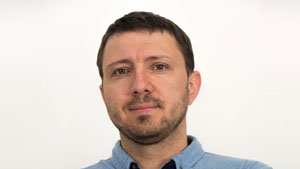 I’ve been with Bohemia Interactive for quite a long time now, but our full co-operation began four years ago. So far, I’ve contributed to Arma 2: Operation Arrowhead , Carrier Command: Gaea Mission, Arma 3, Take On Mars, and DayZ. My current focus is to bring the overall direction for our game audio, and the audio engine with all its specific features, to a new level. My favorite BI game is Arma 3. I suppose people tend to grow fond of the projects they’re working on ;-)
I’ve been with Bohemia Interactive for quite a long time now, but our full co-operation began four years ago. So far, I’ve contributed to Arma 2: Operation Arrowhead , Carrier Command: Gaea Mission, Arma 3, Take On Mars, and DayZ. My current focus is to bring the overall direction for our game audio, and the audio engine with all its specific features, to a new level. My favorite BI game is Arma 3. I suppose people tend to grow fond of the projects they’re working on ;-)
And can you give us a random fact about yourself?
I studied physics. A bonus fact: I love chili - I mean CH!L! (one million SHU and more).
Sound Byte
In short, what does a sound engine do? And can you name some of the improvements over previous Arma games?
Broadly explained, a sound engine is responsible for transforming and mixing thousands of audio samples, according to a set of design rules, into your ears. As you might’ve guessed, the audio engine is basically the technical core for audio in a game.
In Arma 3, we’ve implemented lots of changes and new features into the audio engine, such as the usage of stereo samples in first person, an improved attenuation curve, new filtering chains, and smoother vehicle engine sounds. More features and improvements - such as an advanced fatigue sound system - are being worked on. Plus, we've recently expanded our Audio team with two new sound designers, which is definitely going to help raise the bar further.
How do you get your audio samples and ensure the audio authenticity in Arma 3?
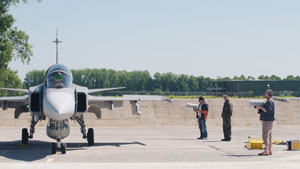 It’s essential for sound designers to experience the ‘real’ thing. And, with regards to military equipment, it’s twice as important. Fortunately, we were lucky enough to do many recording sessions on shooting ranges, army bases, and airports, which meant we could get most of the samples in Arma 3 by ourselves. Besides recording these samples, it’s also about having the experience. This gives a sound designer a much better (and sometimes horrifying) idea of the power, dynamic range, and lower frequencies - which are things you can’t really record, but are essential for the in-game audio design.
It’s essential for sound designers to experience the ‘real’ thing. And, with regards to military equipment, it’s twice as important. Fortunately, we were lucky enough to do many recording sessions on shooting ranges, army bases, and airports, which meant we could get most of the samples in Arma 3 by ourselves. Besides recording these samples, it’s also about having the experience. This gives a sound designer a much better (and sometimes horrifying) idea of the power, dynamic range, and lower frequencies - which are things you can’t really record, but are essential for the in-game audio design.
What is the most challenging aspect of being a sound designer on a game like Arma 3?
Well, in comparison to, let’s say, movie sound designers, we need to create more than just one superior sound. For example, when a vehicle drives by in the game, it has to sound splendid from every direction, in any possible situation. We also have to keep in mind that Arma is a sandbox game, and many solutions have to be developed with this in mind – with ambient sounds being one clear example.
Radio Protocol, Over
The radio protocol in previous Arma games became somewhat notorious. Can you explain what’s different now?
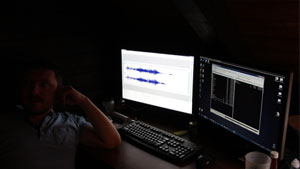 Improving the radio protocol was a challenge to say the least. It required a lot of research. We spent a long time improving the design, trying to make it sound more natural and convincing. Basically, sentences are no longer split into single words, and we’re now using parts of the sentences instead - with cuts on more natural positions. We also recorded the most used parts several times, to create more variation. To give you some idea, the total count of radio protocol samples for all actors combined reaches a hundred thousand! Also, in previous Arma games the radio protocol was divided into ‘stealth’ and ‘neutral’ classes. However, in Arma 3, we added an entire new class: ‘combat’. It’s basically a third kind of intonation, which is used by the game when you enter an intense situation. Due to these tweaks and additions, I think the radio protocol in Arma 3 really took a leap forward, and we’re proud of the result!
Improving the radio protocol was a challenge to say the least. It required a lot of research. We spent a long time improving the design, trying to make it sound more natural and convincing. Basically, sentences are no longer split into single words, and we’re now using parts of the sentences instead - with cuts on more natural positions. We also recorded the most used parts several times, to create more variation. To give you some idea, the total count of radio protocol samples for all actors combined reaches a hundred thousand! Also, in previous Arma games the radio protocol was divided into ‘stealth’ and ‘neutral’ classes. However, in Arma 3, we added an entire new class: ‘combat’. It’s basically a third kind of intonation, which is used by the game when you enter an intense situation. Due to these tweaks and additions, I think the radio protocol in Arma 3 really took a leap forward, and we’re proud of the result!
Arma 2 Radio Protocol (old)
Arma 3 Radio Protocol (new)
On top of English, the radio protocols are also available in Farsi. How does this work – was this something you outsourced?
We had our English script translated by an external company, but we did the Farsi recording ourselves. That was is not that easy though. Imagine you have to cut a sentence when you don’t understand a single word. After a while I did get used to it, even to the point that I found myself answering my wife with “Daryaft shod” (roger that)! The great thing is that, even though the protocol is designed for English, with the new approach it was much easier to do a foreign language, and still get good results!
Soundtracking
The Arma 3 ‘This Is War’ main theme song sounds familiar. How come?
The Arma 3 theme song is a tribute to the original Operation Flashpoint (Arma: Cold War Assault) theme, which was composed by Ondrej Matejka, and with whom I composed the Arma 3 soundtrack. It was really cool to take his iconic track, and experiment with different instrumentation. Overall, Ondrej and I tried to make the Arma 3 soundtrack distinct while keeping the series’ legacy intact. Ondrej has a great sense for original music with a refined sort of simplicity – while I myself like to build massive track compositions. I think the combination of these strengths and styles worked out really well.
Anyway, here’s a taste of 15 years of evolution:
Each campaign episode has a distinct theme (Survive/Adapt/Win). How did you incorporate the theme of each in the new songs?
The basis for each episode’s theme song was to have an orchestral arrangement supported by electronic beats - incorporating the contrast between brutal power and the drama of war. Then there are some Southern-Europe and Middle-Eastern influences in the music, which represent Arma 3’s location and dominating factions.
Using this as the basis, the theme songs for each separate episode intended to convey the matching atmosphere – translating Survive/Adapt/Win into Tension/Forcefulness/Epic. For the Zeus main theme, we tried to make something that feels as distinct as Zeus, but still fits the Arma 3 sound palette.
General questions
And after a long day of making games, what do you like to do to relax and unwind?
Hanging out with my 2-year old daughter, who continues to amaze me every day!
What tip(s) would you give to the audio designers out there?
It’s not really a tip, but if you’re an audio designer, you might want to follow my mantra: “If you feel you’re running out of ideas and inspiration, you haven’t even started to work!”
Traveling with the speed of sound, a tsunami of audio waves is on its way to flood the world with static noise. Before all video games turn to silent, you have the opportunity to save exactly one game from drowning in its own frequency. Which would it be?
The game with the best sound effects ever: chess (can someone mod this into Arma 3 please?)
